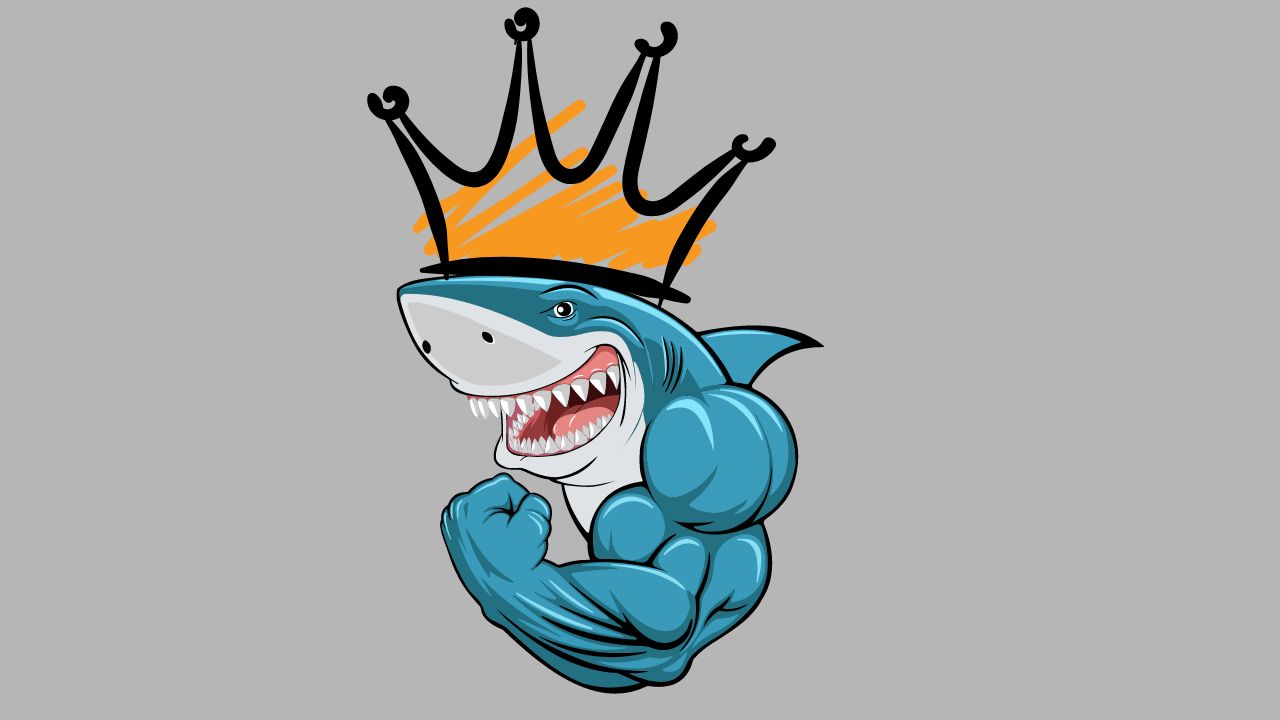Sharks, with their powerful presence and mystique, have captured the imaginations of diverse cultures, inspiring the creation of deities and mythical figures associated with the deep blue. From the islands of Hawaii to the shores of Fiji and even within the realms of comic book fiction, shark gods have emerged as symbols of power, protection, and the enigmatic forces that govern the oceans.
This article delves into the narratives surrounding Kāmohoaliʻi and Ukupanipo from Hawaiian mythology, Dakuwaqa in Fijian lore, and the fictional Shark God of DC Comics. Through these diverse tales, we explore these shark deities’ cultural and imaginative significance across different realms.
Shark Deities Across Realms: Exploring Kāmohoaliʻi, Ukupanipo, Dakuwaqa, Ngalung Kalla, Apanuugpak and The Shark God in Mythology and Fiction
1. Kāmohoaliʻi: The Shark God of Hawaii
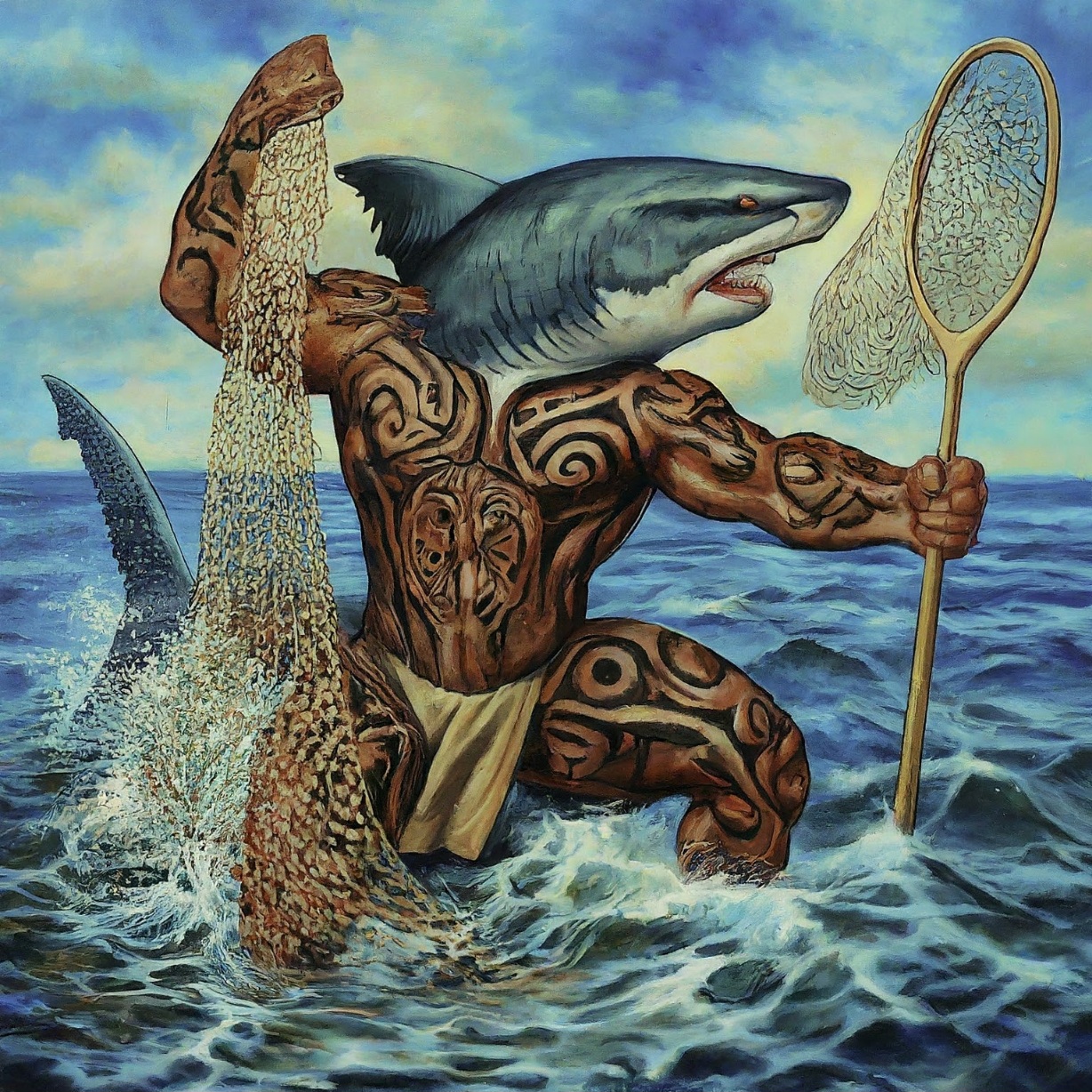
Divine Lineage and Transformative Powers:
a. Hawaiian Pantheon: Kāmohoaliʻi, a central figure in Hawaiian mythology, is part of the pantheon that governs the spiritual landscape of the islands.
b. Shape-Shifting Deity: Kāmohoaliʻi is renowned for his ability to shape-shift between human and shark forms. This transformative power symbolizes his fluidity between the terrestrial and oceanic realms.
Guardian of the Sea:
a. Protector of Mariners: Kāmohoaliʻi is often revered as a guardian deity, watching over mariners and ensuring safe voyages. Sailors seek his guidance and protection when navigating the vast Pacific waters.
b. Connection to Pele: As the brother of Pele, the goddess of fire and volcanoes, Kāmohoaliʻi embodies the harmonious relationship between the elements of fire and water in Hawaiian cosmology.
2. Ukupanipo: The Shark God of the Night

Ukupanipo, known as the “night-walking shark,” is a fascinating figure in Hawaiian mythology. Unlike many fearsome shark gods, he holds a curious duality associated with both bounty and danger.
Nocturnal Guardian:
a. Hawaiian Night Sky: Ukupanipo, a lesser-known shark god in Hawaiian mythology, is associated with the night sky and the celestial realm.
b. Shark Constellation: Ukupanipo is said to manifest as a shark constellation, patrolling the nocturnal heavens and symbolizing protection during the mysterious hours of the night.
Nighttime Mythology:
a. Mystical Influences: Ukupanipo’s realm extends beyond the physical oceans, delving into Hawaiian mythology’s mystical and unseen dimensions.
b. Guardian of Dreams: In some interpretations, Ukupanipo is considered a guardian of dreams, offering guidance and protection to those who navigate the ethereal landscapes of the night.
The Protector:
- He’s seen as a guardian of the night, patrolling the depths and ensuring the safety of those who travel its waters.
- He controls the movements of fish, sometimes driving them away from shore as punishment, but also guiding them closer to bless deserving fishermen.
- His presence ensures balance in the ecosystem, reminding humans of their dependence on the ocean’s bounty.
The Shadowy Figure:
- His nocturnal nature adds an air of mystery and potential threat.
- Some legends depict him as a shapeshifter, appearing as a human with a telltale shark-mouth mark under his shoulder blades.
- His unpredictable behaviors keep fishermen wary, respecting his power and offering him tribute to gain his favor.
Unique Depictions:
- While often portrayed as a powerful shark, some stories describe him as a man-shark hybrid, reflecting his connection to human and natural realms.
- He might not always be benevolent, testing the respect and offerings of mortals before granting their wishes.
- His connection to the night sky and celestial bodies like the moon lends him an almost cosmic significance, symbolizing the world’s interconnectedness.
3. Dakuwaqa: The Fijian Shark God
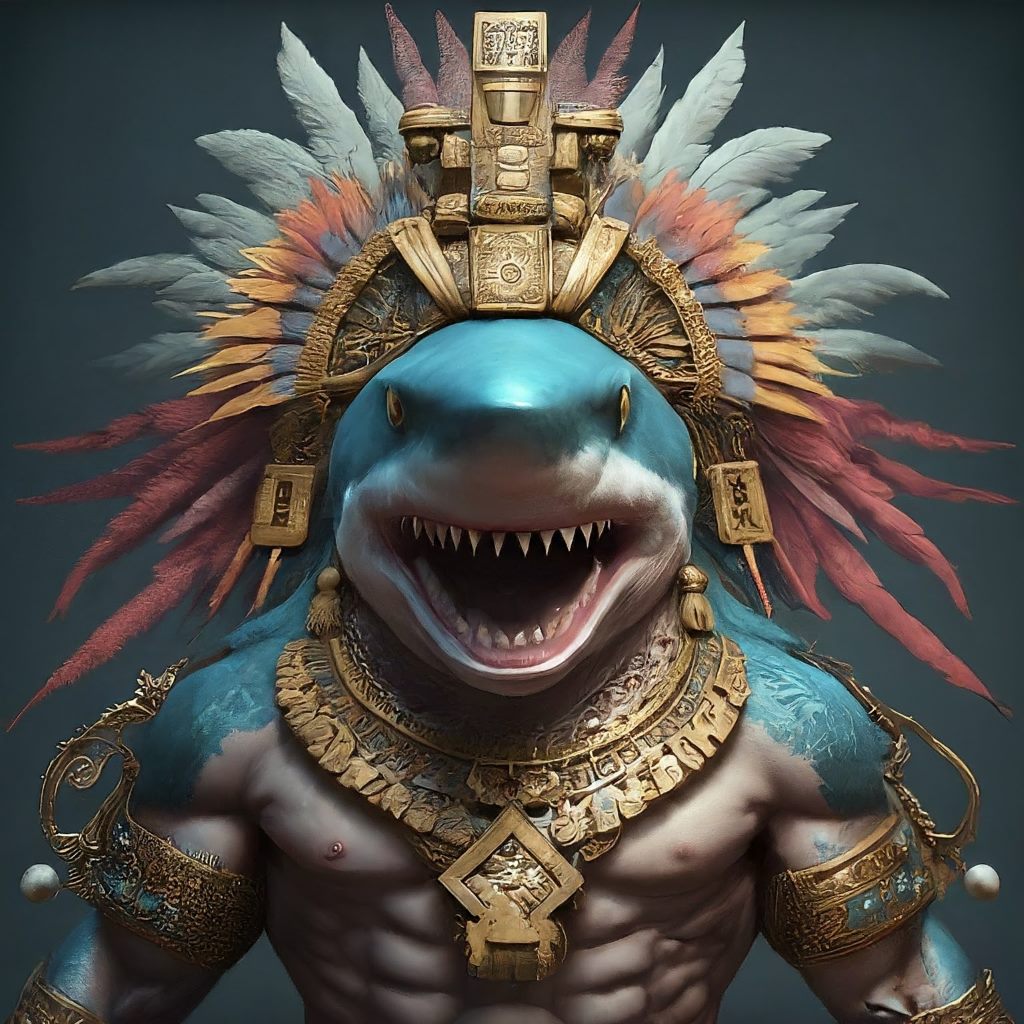
Dakuwaqa, though known for his fierce form, is not simply a destructive force. He is the guardian of the seas, ensuring balance and protecting fishermen from harm. His wrathful nature serves as a reminder to respect the ocean’s power and maintain harmony with it.
Supreme Sea Deity:
a. Fijian Maritime Traditions: Dakuwaqa holds a central place in Fijian mythology as the supreme god of the sea and the guardian associated with sharks.
b. Shape-Shifting Abilities: Similar to Kāmohoaliʻi, Dakuwaqa possesses shape-shifting abilities, enabling him to traverse both the human and shark realms.
Cultural Significance:
a. Protector of Fishermen: Dakuwaqa is revered by Fijian fishermen who seek his protection and blessings for successful voyages. Rituals and ceremonies are dedicated to appeasing the powerful sea deity.
b. Symbol of Authority: Dakuwaqa’s association with sharks symbolizes authority and power, emphasizing the respect accorded to the deity in Fijian maritime traditions.
c. Guardian of Kadavu: According to legend, Dakuwaqa once attempted to conquer Kadavu Island but was defeated by the island’s goddess, pledging eternal protection in return. He remains the sacred guardian of Kadavu, a symbol of the island’s deep connection to the ocean.
4. Ngalung Kalla: The Shark God of the Torres Strait Islanders
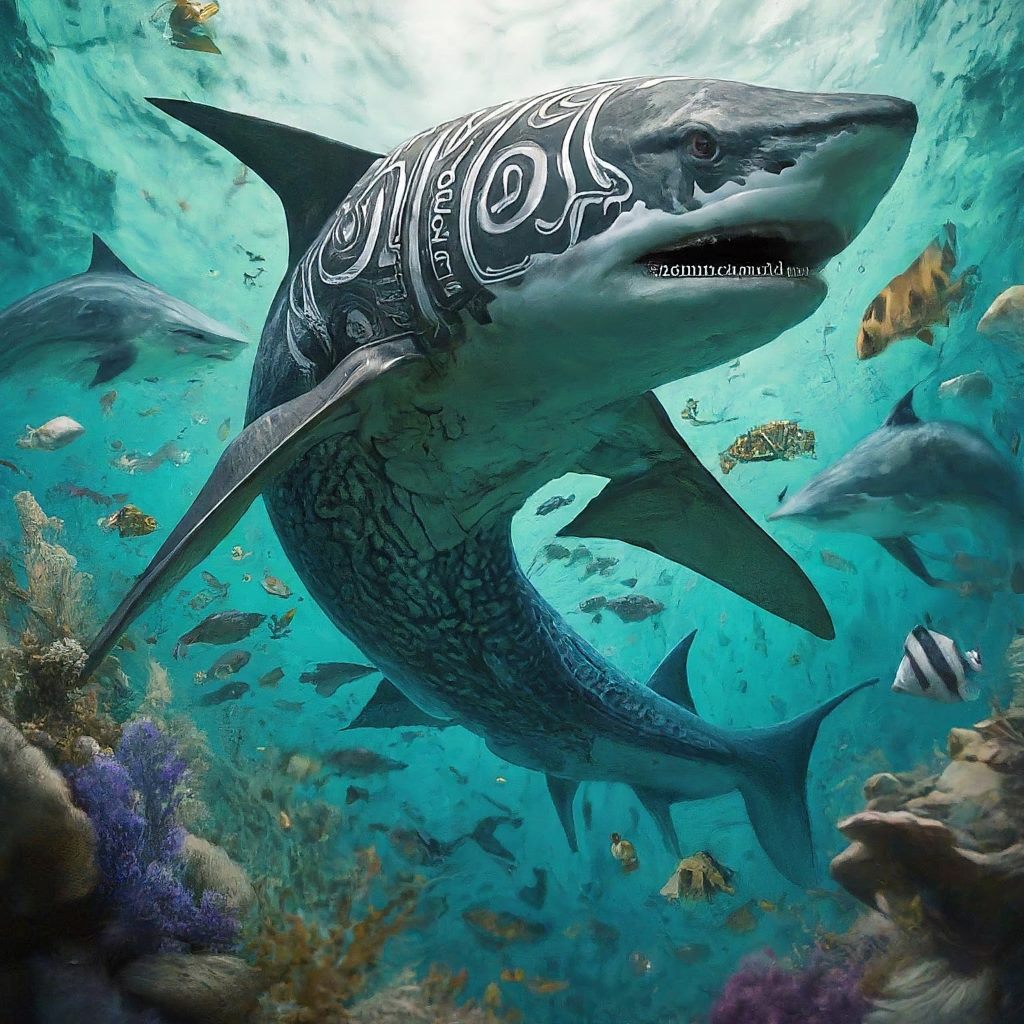
Torres Strait Islander Beliefs:
a. Cultural Significance: Ngalung Kalla is a revered figure in the mythology of the Torres Strait Islanders, a Melanesian people with a deep connection to the seas and marine life.
b. Guardian of Marine Life: Ngalung Kalla is acknowledged as the guardian of sharks and other marine creatures, embodying the interconnectedness between the spiritual and natural realms in Torres Strait Islander belief systems.
Ngalung Kalla’s Role:
a. Ceremonial Worship: The Torres Strait Islanders engage in ceremonial worship to honor Ngalung Kalla, seeking his blessings for successful fishing expeditions and bountiful harvests from the sea.
b. Spiritual Intermediary: Ngalung Kalla serves as a spiritual intermediary, fostering a harmonious relationship between the islanders and the diverse marine life that sustains their communities.
5. Apanuugpak: The Inuit Shark God of the Arctic Seas
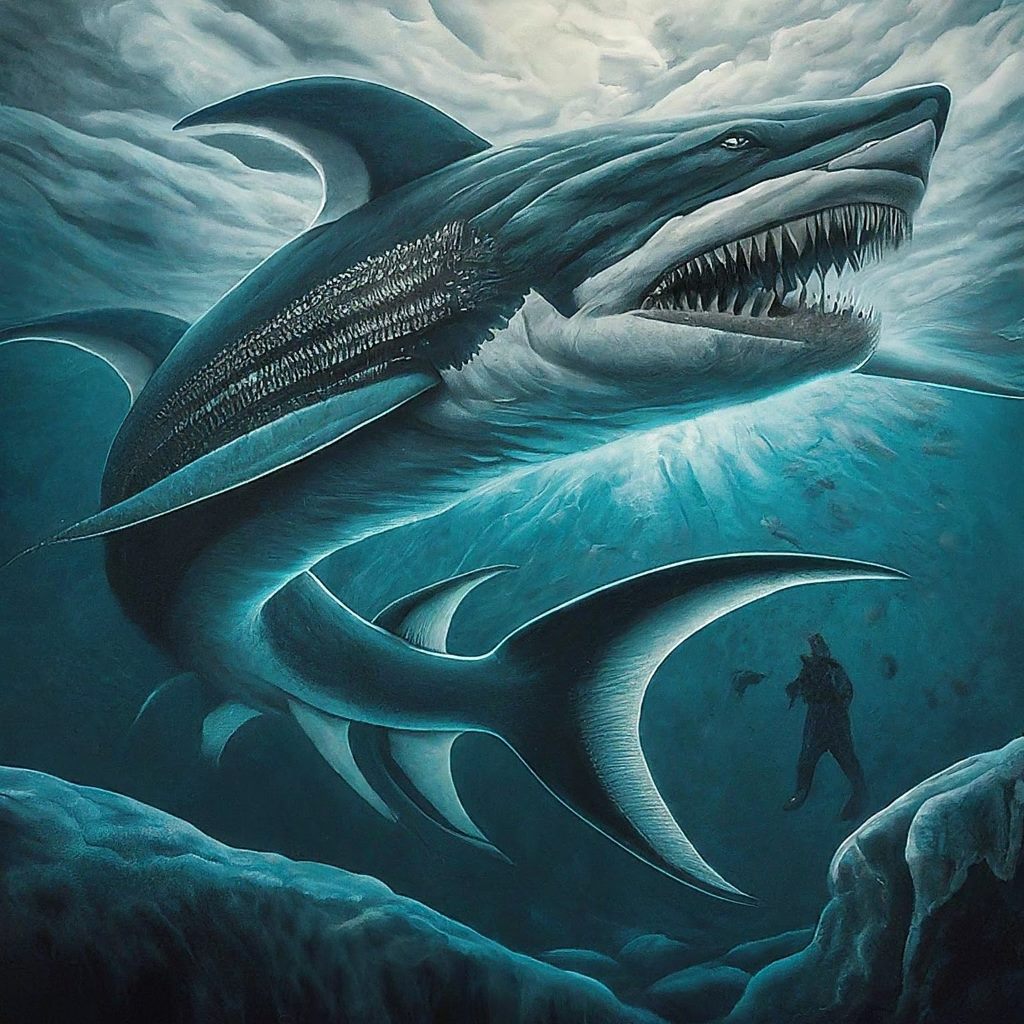
Arctic Guardian:
a. Origins in Inuit Mythology: Apanuugpak, a prominent figure in Inuit mythology, is hailed as the guardian of the Arctic seas, including the frigid waters where sharks roam.
b. Symbolism of Adaptation: Apanuugpak’s connection to sharks symbolizes adaptability and resilience in the face of the harsh Arctic conditions, embodying the spirit of survival in this unforgiving environment.
Stories of Apanuugpak:
a. Shapeshifting Guardian: Apanuugpak is often depicted as a shapeshifter, seamlessly transitioning between human and shark forms. This ability reflects the deity’s fluidity and connection to the diverse marine life of the Arctic.
b. Protector of Seafarers: Apanuugpak is revered as a protector of seafarers, guiding them through treacherous waters and ensuring safe passage. Tales of his benevolence emphasize the importance of respecting the delicate balance between humanity and the natural world.
6. The Shark God (Lord Chondrakha): Father of King Shark in DC Comics
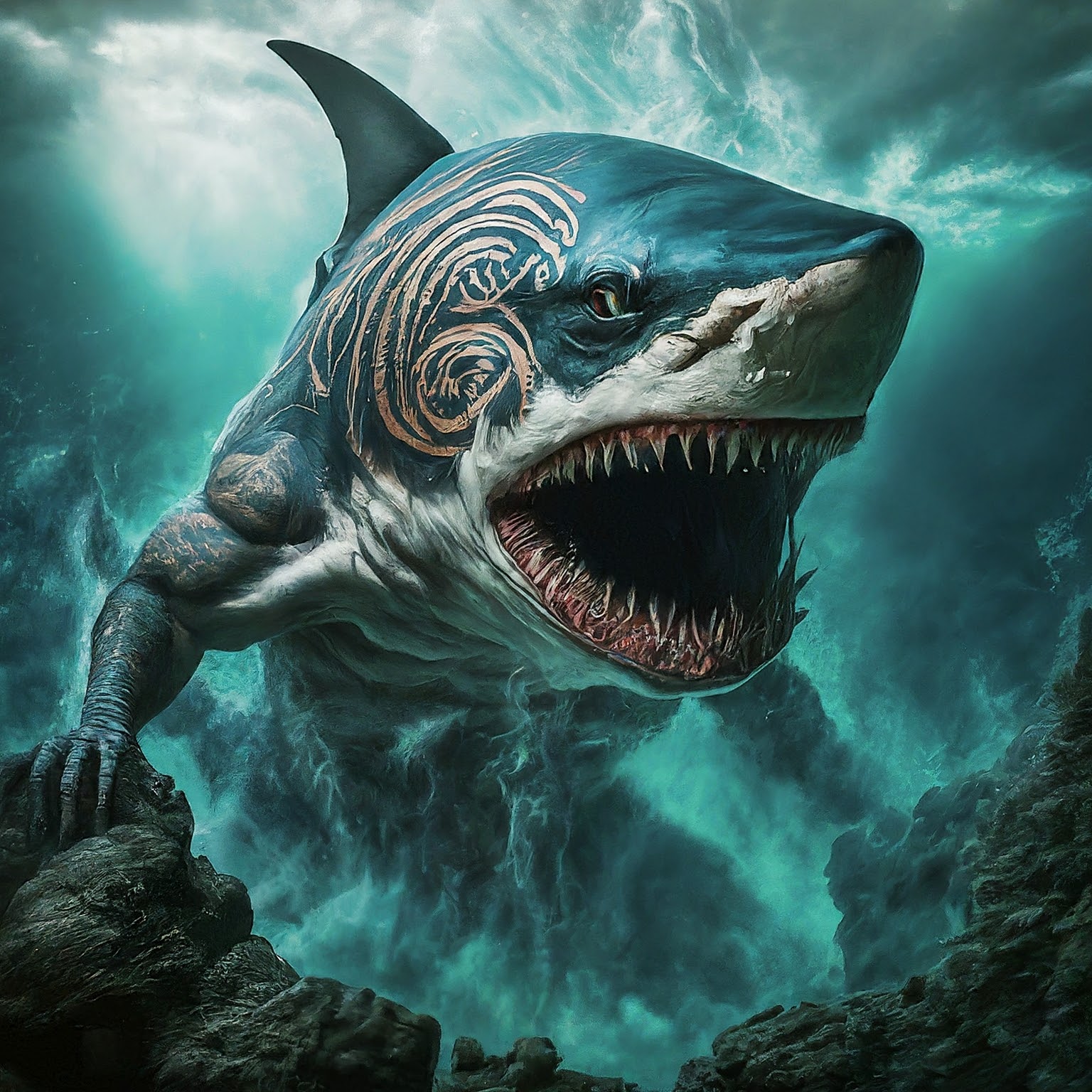
Fictional Origins in Comics:
a. DC Comics Universe: The Shark God appears in DC Comics as the father of King Shark, a fictional character with shark-like features and abilities.
b. Supernatural Origins: In this fictional realm, the Shark God represents a supernatural force, and King Shark inherits his shark-like traits from this divine ancestry.
King Shark’s Mythical Heritage:
a. Hybrid Being: King Shark is portrayed as a hybrid being, part human and part shark, reflecting the mythical lineage bestowed upon him by the Shark God.
b. Struggles with Identity: The character’s narrative often explores themes of identity and the challenges of reconciling his human and shark aspects, adding value to it.
More shark/water deities
From Polynesian Mythology:
Aitu-Ki, often referred to as the “God of Sharks,” holds a significant place in Polynesian mythology. In many Polynesian cultures, sharks are considered sacred and are seen as protectors and guides. The reverence for sharks and their divine representation through deities like Aitu-Ki highlights the deep respect and connection these cultures have with the ocean and its inhabitants.
This kind of mythology underscores the cultural importance of the ocean and its creatures, reflecting how deeply intertwined the natural world and spiritual beliefs are in Polynesian societies.
From Fijian Mythology:
Qaniu, the Fijian shark god: A fierce male warrior with the head of a shark and the body of a human, wielding a club and adorned with Fijian war paint.
From Norse Mythology:
Ran, the Norse goddess of the sea: A powerful female figure with a net, surrounded by various marine creatures, including sharks.
From Greek Mythology
Palaemon is actually a figure from Greek mythology, not specifically known as the “God of Sharks.” Palaemon, also known as Palaimon, is a young sea-god who, along with his mother Leukothea, helped sailors in distress.
He was originally a mortal boy named Melikertes who was transformed into a sea-god after a tragic event involving his mother.
While Palaemon is associated with the sea and sailors, he isn’t particularly linked to sharks.
Cross-Cultural Reflections and Symbolism
Common Themes Among Shark Deities:
a. Protection and Guardianship: Across Hawaiian, Fijian, and fictional realms, shark deities embody protective roles, safeguarding seafarers and maritime communities.
b. Transformative Abilities: Shape-shifting abilities are a recurring motif, emphasizing the fluidity and adaptability associated with these powerful beings.
The symbolism of Sharks:
a. Power and Authority: The shark, as a symbolic representation in these myths, signifies power, authority, and a deep connection to the primordial forces of the ocean.
b. Environmental Stewardship: The reverence for shark deities in various cultures underscores the importance of environmental stewardship and sustainable practices in relation to the oceans.
Contemporary Reverence and Adaptations
Cultural Resilience:
a. Ceremonial Practices: In Hawaii and Fiji, ceremonial practices dedicated to shark deities continue to be observed, reflecting the resilience and continuity of cultural traditions.
b. Artistic Representations: Shark deities are often depicted in various forms of art, from traditional carvings and paintings to contemporary representations that bridge cultural heritage with modern creativity.
Cultural Exchange and Popular Culture:
a. Global Impact: The stories of Kāmohoaliʻi, Ukupanipo, Dakuwaqa, and the Shark God of DC Comics contribute to a global tapestry of cultural exchange, influencing popular culture and artistic expressions worldwide.
b. Environmental Advocacy: The symbolism associated with shark deities transcends cultural boundaries, contributing to global efforts in marine conservation and environmental advocacy.
Conclusion:
Shark deities, whether rooted in ancient mythology or brought to life in fictional universes, stand as powerful symbols that transcend time and culture. From Kāmohoaliʻi’s protective watch over Hawaiian waters to Dakuwaqa’s supremacy in Fijian maritime traditions, these shark gods embody the essence of the oceans and the profound connection between humanity and the seas.
In the imaginative realm of DC Comics, the Shark God takes on a new form, influencing narratives that explore the complex interplay between the human and the divine. Through these diverse tales, we gain not only a deeper appreciation for the cultural richness encapsulated in shark deities but also an understanding of the enduring significance of sharks in the collective consciousness of humanity.
